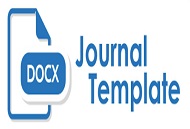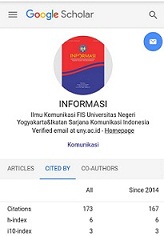Digital Literacy Landscape of Novice Voters in the 2024 Election in Indonesia
DOI:
https://doi.org/10.21831/informasi.v54i2.71246Keywords:
Digital literacy, Novice voters, ElectionAbstract
Elections are one of the times when Indonesian democracy runs because the people themselves will choose a pair of president and vice president candidates along with the existing legislature. Voters need to have enough information about the candidates in order to choose the best among them, especially novice voters. Novice voters need to have good digital literacy in facing the upcoming 2024 elections. The 2024 election itself is mostly from young people who are novice voters. The purpose of this study is to determine the digital literacy readiness of novice voters in 2024 elections. In addition, it will also be known what factors influence this readiness and the impact of the readiness of novice voters on their participation in the election later. This study uses a quantitative approach with descriptive methods. Data collection was carried out using questionnaires as primary data and literature studies as secondary data. The results and conclusions obtained in this study are that the majority of novice voters use social media as an information platform about the 2024 elections with varying levels of trust in the information. Most of the respondents chose not to share the information obtained related to the verification of uncertain news.
References
Abdullah, A. A. (2020, September). Statistical Literacy For Beginner Voter. In Ahmad Dahlan International Conference on Mathematics and Mathematics Education (Vol. 1, No. 1, pp. 76-81).
Anam, K. (2023, February 14). Paling Rendah di Asean, Tingkat Literasi digital Ri Cuma 62%. CNBC Indonesia. https://www.cnbcindonesia.com/tech/20230214171553-37-413790/paling-rendah-di-asean-tingkat-literasi-digital-ri-cuma-62
Andriyendi, D. O., Nurman, S., & Dewi, S. F. (2023). Media sosial dan pengaruhnya terhadap partisipasi politik pemilih pemula pada Pilkada. Journal of Education, Cultural and Politics, 3(1), 101-111.
Azzuhri, H., Ningsih, T., & Domas, Y. O. (2022). Partisipasi Politik Pemilih
Pemula Di Desa Sukaraja Kecamatan Sukamerindu Kabupaten Lahat Sumatera Selatan. Jurnal Tapis: Jurnal Teropong Aspirasi Politik Islam, 18(1), 66-76.
Dirgantara, A. (2022, July 13). Data KPU: Ada 578.139 Pemilih Baru Dari total 190 Juta Orang. KOMPAS.com. Retrieved January 17, 2023, from https://nasional.kompas.com/read/2022/07/13/11090601/data-kpu-ada-578139-pemilih-baru-dari-total-190-juta-orang.
Febriani, Y., Rafni, A., & Suryanef, S. (2022). Political Socialization of the General Election Commission (KPU) of Solok Regency for Novice Voters in the 2020 Regional Elections. AURELIA: Jurnal Penelitian dan Pengabdian Masyarakat Indonesia, 1(2), 239-245.
Ginting, R. V. B., Arindani, D., Lubis, C. M. W., & Shella, A. P. (2021). Literasi digital sebagai wujud pemberdayaan masyarakat di era globalisasi. Jurnal Pasopati: Pengabdian Masyarakat dan Inovasi Pengembangan Teknologi, 3(2), 118-122.
Muhtadin, M. (2023). Politik Hukum Partai Politik dan Pemilihan Umum. AHKAM, 2(2), 210-232.
Makarim, M. R. F., & Fahmi, K. (2022). Permasalahan dan Dampak dari Implementasi Sistem Pemilu Proporsional Terbuka terhadap Sistem Politik. Journal of Social and Policy Issues, 50-57.
Naufal, H. A. (2021). Literasi digital. Perspektif, 1(2), 195-202.
Poddar, V., Mondal, S., Dutta, N., & Dey, H. (2018, November). Incorporating advancements in voting strategies: A survey. In 2018 9th IEEE Annual Ubiquitous Computing, Electronics & Mobile Communication Conference (UEMCON) (pp. 249-254). IEEE.
Rahmat, B., & Esther, E. (2016). Perilaku pemilih pemula dalam pilkada serentak di Kecamatan Ciomas Kabupaten Serang tahun 2015. Jurnal Ilmu Pemerintahan Widya Praja, 42(2), 25-25.
Rajagukguk, J., Damanik, G. Y., Aruan, E., & Gulo, R. S. (2022). GOLPUT DAN PEMILU 2024. Jurnal Ilmu Sosial Dan Politik, 2(2), 82-89.
Sugiyono. (2015). Metode penelitian kuantitatif, kualitatif dan r&d. Bandung: Alfabeta.
Tazijan, F., Aboo Bakar, R., & Mohd Ramli, N. F. (2022). The drive of digital literacy skills in the 21st century. International Journal of Practices in Teaching and Learning (IJPTL), 2(1).
Wardhani, P. S. N. (2018). Partisipasi Politik Pemilih Pemula dalam Pemilihan Umum. Jupiis: Jurnal Pendidikan Ilmu-Ilmu Sosial, 10(1), 57-62. DOI: 10.24114/jupiis.v10i1.8407.g9060
Wardle, C., & Derakhshan, H. (2017). Misinformation and disinformation: A primer for the 21st century. MIT Press.
Wibawana, W. A. (2023a, January 18). Apa Saja Yang Dipilih Dalam Pemilu 2024? Cek Infonya Di Sini. detiknews. https://news.detik.com/pemilu/d-6521367/apa-saja-yang-dipilih-dalam-pemilu-2024-cek-infonya-di-sini
Wibawana, W. A. (2023b, February 3). Apa Saja syarat Menjadi Pemilih Dalam Pemilu? Simak Aturannya. detiknews. https://news.detik.com/pemilu/d-6549231/apa-saja-syarat-menjadi-pemilih-dalam-pemilu-simak-aturannya
Downloads
Published
How to Cite
Issue
Section
Citation Check
License
Authors who publish with this journal agree to the following terms:
- Authors retain copyright and grant the journal right of first publication with the work simultaneously licensed under a Creative Commons Attribution License that allows others to share the work with an acknowledgement of the work's authorship and initial publication in this journal.
- Authors are able to enter into separate, additional contractual arrangements for the non-exclusive distribution of the journal's published version of the work (e.g., post it to an institutional repository or publish it in a book), with an acknowledgement of its initial publication in this journal.
- Authors are permitted and encouraged to post their work online (e.g., in institutional repositories or on their website) prior to and during the submission process, as it can lead to productive exchanges, as well as earlier and greater citation of published work (See The Effect of Open Access).











